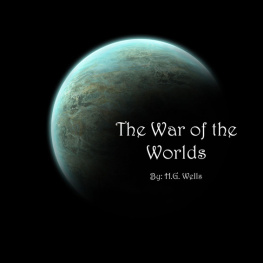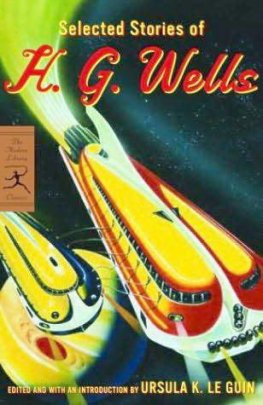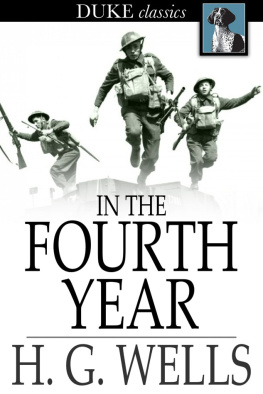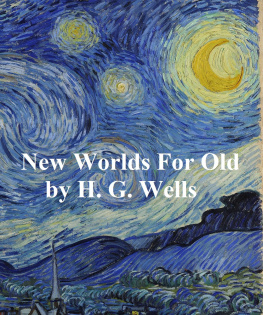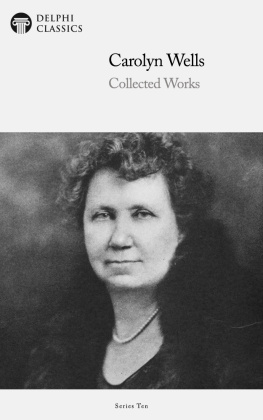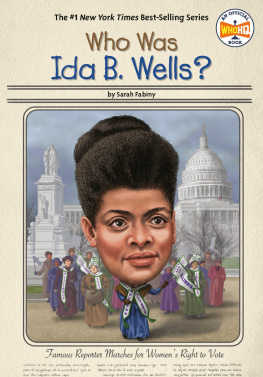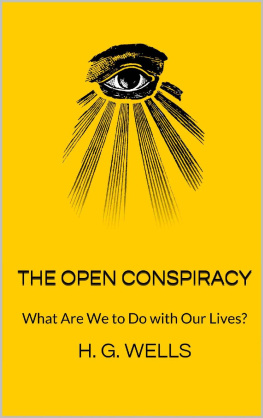H G Wells - The war of the worlds
Here you can read online H G Wells - The war of the worlds full text of the book (entire story) in english for free. Download pdf and epub, get meaning, cover and reviews about this ebook. City: Raleigh, N.C, year: 199-?, publisher: Alex Catalogue, genre: Science. Description of the work, (preface) as well as reviews are available. Best literature library LitArk.com created for fans of good reading and offers a wide selection of genres:
Romance novel
Science fiction
Adventure
Detective
Science
History
Home and family
Prose
Art
Politics
Computer
Non-fiction
Religion
Business
Children
Humor
Choose a favorite category and find really read worthwhile books. Enjoy immersion in the world of imagination, feel the emotions of the characters or learn something new for yourself, make an fascinating discovery.
The war of the worlds: summary, description and annotation
We offer to read an annotation, description, summary or preface (depends on what the author of the book "The war of the worlds" wrote himself). If you haven't found the necessary information about the book — write in the comments, we will try to find it.
The war of the worlds — read online for free the complete book (whole text) full work
Below is the text of the book, divided by pages. System saving the place of the last page read, allows you to conveniently read the book "The war of the worlds" online for free, without having to search again every time where you left off. Put a bookmark, and you can go to the page where you finished reading at any time.
Font size:
Interval:
Bookmark:
The War of the Worlds
by H. G. Wells
Herbert George Wells was born atAtlas House, 47 High Street, Bromley, in the county of Kent, on 21 September1866. Called "Bertie" in the family, he was the fourth and last childof Joseph Wells (a former domestic gardener, and at the time a shopkeeper andprofessional cricketer) and his wife Sarah Neal (a former domestic servant).The family was of the impoverished lower middle class. An inheritance hadallowed the family to acquire a shop in which they sold china and sportinggoods, although it failed to prosper: the stock was old and worn out, and thelocation was poor. Joseph Wells managed to earn a meager income, but little ofit came from the shop; Joseph received an unsteady amount of money from playingprofessional cricket for the Kent county team. Payment for skilled bowlers andbatsmen came from voluntary donations afterwards, or from small payments fromthe clubs where matches were played.
A defining incident of youngWells's life was an accident he had in 1874, which left him bedridden with abroken leg. To pass the time he started reading books from the local library,brought to him by his father. He soon became devoted to the other worlds andlives to which books gave him access; they also stimulated his desire to write.Later that year he entered Thomas Morley's Commercial Academy, a private schoolfounded in 1849 following the bankruptcy of Morley's earlier school. Theteaching was erratic, the curriculum mostly focused, Wells later said, onproducing copperplate handwriting and doing the sort of sums useful totradesmen. Wells continued at Morley's Academy until 1880. In 1877, his father,Joseph Wells, fractured his thigh. The accident effectively put an end toJoseph's career as a cricketer, and his subsequent earnings as a shopkeeperwere not enough to compensate for the loss of the primary source of familyincome.
No longer able to supportthemselves financially, the family instead sought to place their sons asapprentices in various occupations. From 1880 to 1883, Wells had an unhappyapprenticeship as a draper at the Southsea Drapery Emporium, Hyde's. Hisexperiences at Hyde's were later used as inspiration for some of his novelmaterial The Wheels of Chance and Kipps, which delve into the life of adraper's apprentice as well as providing a critique of the world's distributionof wealth.
Herbert's parents' marriage was aturbulent relationship: due primarily to his mother being a Protestant and hisfather a self-confessed freethinker. When his mother returned to work as alady's maid (at Uppark, a country house in Sussex), one of the conditions ofwork was that she would not be permitted to have living space for her husbandand children. Thereafter, she and Joseph lived separate lives: though theynever divorced and neither ever developed extramarital liaisons. As aconsequence, Herbert's personal troubles increased as he subsequently failed asa draper and also, later, as a chemist's assistant. After each failure, hewould arrive at Uppark "the bad shilling back again!" as hesaid and stay there until a fresh start could be arranged for him.Fortunately for Herbert, Uppark had a magnificent library in which he immersedhimself, reading many classic works, including Plato's Republic, and More'sUtopia. This would be the beginning of Herbert George Wells's venture intoliterature.
In October 1879 Wells's motherarranged through a distant relative, Arthur Williams, for him to join theNational School at Wookey in Somerset as a pupil-teacher, a senior pupil whoacted as a teacher of younger children. In December that year, however,Williams was dismissed for irregularities in his qualifications and Wells wasreturned to Uppark. After a short apprenticeship at a chemist in nearbyMidhurst, and an even shorter stay as a boarder at Midhurst Grammar School, hesigned his apprenticeship papers at Hyde's. In 1883 Wells persuaded his parentsto release him from the apprenticeship, taking an opportunity offered byMidhurst Grammar School again to become a pupil-teacher; his proficiency inLatin and Science during his previous, short stay had been remembered.
The years he spent in Southsea hadbeen the most miserable of his life to that point, but his good fortune atsecuring a position at Midhurst Grammar School meant that Wells could continuehis self-education in earnest. The following year, Wells won a scholarship tothe Normal School of Science (later the Royal College of Science in SouthKensington, now part of Imperial College London) in London, studying biologyunder Thomas Henry Huxley. As an alumnus, he later helped to set up the RoyalCollege of Science Association, of which he became the first president in 1909.Wells studied in his new school until 1887 with a weekly allowance oftwenty-one shillings (a guinea) thanks to his scholarship. This ought to havebeen a comfortable sum of money (at the time many working class families had"round about a pound a week" as their entire household income) yet inhis Experiment in Autobiography, Wells speaks of constantly being hungry, andindeed, photographs of him at the time show a youth very thin and malnourished.
He soon entered the DebatingSociety of the school. These years mark the beginning of his interest in apossible reformation of society. At first approaching the subject through TheRepublic by Plato, he soon turned to contemporary ideas of socialism asexpressed by the recently formed Fabian Society and free lectures delivered atKelmscott House, the home of William Morris. He was also among the founders ofThe Science School Journal, a school magazine which allowed him to express hisviews on literature and society, as well as trying his hand at fiction: thefirst version of his novel The Time Machine was published in the journal underthe title, The Chronic Argonauts. The school year 18861887 was the lastyear of his studies. In spite of having previously successfully passed hisexams in both Biology and Physics, his lack of interest in Geology resulted inhis failure to pass and the subsequent loss of his scholarship.
It was not until 1890 that Wellsearned a Bachelor of Science degree in Zoology from the University of LondonExternal Programme. In 188990 he managed to find a post as a teacher atHenley House School where he taught and admired A. A. Milne.
Upon leaving the Normal School ofScience, Wells was left without a source of income. His aunt Maryhisfather's sister-in-lawinvited him to stay with her for a while, whichsolved his immediate problem of accommodation. During his stay at his aunt'sresidence, he grew increasingly interested in her daughter, Isabel. He wouldlater go on to court her.
In 1891 Wells, married his cousinIsabel Mary Wells, but left her in 1894 for one of his students, Amy CatherineRobbins (known as Jane), whom he married in 1895. Poor health took him toSandgate, near Folkestone, where in 1901 he constructed a large family home -Spade House. He had two sons with Amy Catherine: George Philip (known as"Gip") in 1901 (d.1985) and Frank Richard in 1903.
During his marriage to Amy Robbins,Wells had affairs with a number of women, including the American birth-controlactivist Margaret Sanger and novelist Elizabeth von Arnim. In 1909 he had adaughter, Anna-Jane, with the writer Amber Reeves, whose parents, William andMaud Pember Reeves, he had met through the Fabian Society; and in 1914, a son,Anthony West (19141987), by the novelist and feminist Rebecca West,twenty-six years his junior. Despite Amy Catherine's knowledge of some of theseaffairs, she remained married to Wells until her death in 1927. Wells also hadaffairs with Odette Keun and Moura Budberg.
As one method of self-expression,Wells tended to sketch a lot. One common location for these sketches was theendpapers and title pages of his own diaries, and they covered a wide varietyof topics, from political commentary to his feelings toward his literarycontemporaries and his current romantic interests. During his marriage to AmyCatherine, whom he nicknamed Jane, he sketched a considerable number ofpictures, many of them being overt comments on their marriage. It was duringthis period, and this period only, that he called his sketches"picshuas." These picshuas have been the topic of study by Wellsscholars for many years, and recently a book was published on the subject.
Next pageFont size:
Interval:
Bookmark:
Similar books «The war of the worlds»
Look at similar books to The war of the worlds. We have selected literature similar in name and meaning in the hope of providing readers with more options to find new, interesting, not yet read works.
Discussion, reviews of the book The war of the worlds and just readers' own opinions. Leave your comments, write what you think about the work, its meaning or the main characters. Specify what exactly you liked and what you didn't like, and why you think so.

